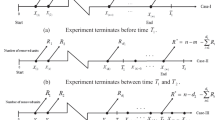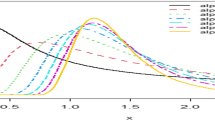Abstract
In the reliability theory and life testing experiments, the Maxwell distribution has established a useful lifetime model due to its increasing failure rate property. To save time and money various types of censoring plans are studied in the literature. One such censoring scheme is adaptive progressive Type-II censoring (APT2C). It has recently become popular in life-testing experiments. The APT2C is a generalization of the progressive censoring scheme and it is very useful in various practical situations when testing material has a long life and high cost. This article deals with the problem of Bayesian and non-Bayesian estimation procedures of the unknown parameter and reliability characteristics of Maxwell distribution under the APT2C scheme. The maximum product spacing and the maximum likelihood estimates of the unknown parameters are obtained in the classical approach. In the Bayesian approach, the Bayes estimates are obtained under squared error loss function and linear exponential loss function with two choices of prior densities, non-informative and informative priors, respectively. The Bayes estimates are calculated using Tierney-Kadanae’s approximation and the Metropolis-Hastings algorithm. The asymptotic confidence interval, bootstrap confidence interval, and highest posterior density (HPD) credible interval are constructed for the interval estimation in the case of classical and Bayesian estimation procedures, respectively. Various estimates obtained in the theory are compared with the help of a Monte Carlo simulation study. Finally, a real data set is studied to show the applicability of the considered model.






Similar content being viewed by others
References
Almetwally E, Almongy H, Rastogi M, Ibrahim M (2020) Maximum product spacing estimation of Weibull distribution under adaptive Type-II progressive censoring schemes. Ann Data Sci 7:257–279
Almetwally EM, Almongy HM, ElSherpieny E (2019) Adaptive Type-II progressive censoring schemes based on maximum product spacing with application of generalized Rayleigh distribution. J Data Sci 17(4):802–831
Balakrishnan N, Aggarwala R (2000) Progressive censoring: theory, methods, and applications. Birkhauser Publisher, Boston
Balakrishnan N, Sandhu R (1995) A simple simulational algorithm for generating progressive Type-II censored samples. Am Stat 49(2):229–230
Bekker A, Roux J (2005) Reliability characteristics of the Maxwell distribution: a Bayes estimation study. Commun Stat Theory Methods 34(11):2169–2178
Chaturvedi A, Kumar N, Kumar K (2018) Statistical inference for the reliability functions of a family of lifetime distributions based on progressive Type-II right censoring. Statistica 78(1):81–101
Chaudhary S, Kumar J, Tomer SK (2017) Estimation of \({P }\) for Maxwell distribution. J Stat Manag Syst 20(3):467–481
Chen M-H, Shao Q-M (1999) Monte Carlo estimation of Bayesian credible and HPD intervals. J Comput Graph Stat 8(1):69–92
Chen S, Gui W (2020) Statistical analysis of a lifetime distribution with a bathtub-shaped failure rate function under adaptive progressive Type-II censoring. Mathematics 8(5):670
Cheng R, Amin N (1983) Estimating parameters in continuous univariate distributions with a shifted origin. J R Stat Soc Ser B (Methodological) 45(3):394–403
Cohen AC (1963) Progressively censored samples in life testing. Technometrics 5(3):327–339
Dey S, Maiti SS (2010) Bayesian estimation of the parameter of Maxwell distribution under different loss functions. J Stat Theory Pract 4(2):279–287
Efron B (1982) The jackknife, the bootstrap and other resampling plans. SIAM, New Delhi
Efron B, Tibshirani RJ (1993) An introduction to the bootstrap. Chapman and Hall, London
Gelman A, Carlin JB, Stern HS, Dunson DB, Vehtari A, Rubin DB (2013) Bayesian data analysis. CRC Press, New York
Gelman A, Rubin DB (1992) Inference from iterative simulation using multiple sequences. Stat Sci 7(4):457–472
Gui W (2014) Double acceptance sampling plan for time truncated life tests based on Maxwell distribution. Am J Math Manag Sci 33(2):98–109
Haj Ahmad H, Salah MM, Eliwa M, Ali Alhussain Z, Almetwally EM, Ahmed EA (2022) Bayesian and non-Bayesian inference under adaptive Type-II progressive censored sample with exponentiated power Lindley distribution. J Appl Stat 49(12):2981–3001
Hall P (1988) Theoretical comparison of bootstrap confidence intervals. Ann Stat 16(3):927–953
Hastings WK (1970) Monte Carlo sampling methods using Markov chains and their applications. Biometrika 57:97–109
Krishna H, Malik M (2012) Reliability estimation in Maxwell distribution with progressively Type-II censored data. J Stat Comput Simul 82(4):623–641
Krishna H, Vivekanand V, Kumar K (2015) Estimation in Maxwell distribution with randomly censored data. J Stat Comput Simul 85(17):3560–3578
Kumar I, Kumar K (2022) On estimation of \(P(V< U)\) for inverse Pareto distribution under progressively censored data. Int J Syst Assur Eng Manag 13(1):189–202
Kumar K, Garg R, Krishna H (2017) Nakagami distribution as a reliability model under progressive censoring. Int J Syst Assur Eng Manag 8(1):109–122
Kumari A, Kumar K (2023) Bayesian and non-Bayesian estimation in log-logistic lifetime model using adaptive progressively censored data. Int J Agric Stat Sci 19(1):17–32
Kumari A, Kumar S, Kumar K (2022) Multicomponent stress-strength reliability estimation of inverse Pareto lifetime model under progressively censored data. Int J Agric Stat Sci 18(2):475–486
Mathai AM, Haubold HJ (2018) A generalized entropy optimization and Maxwell–Boltzmann distribution. Eur Phys J B 91(39):1–10
Metropolis N, Ulam S (1949) The Monte Carlo method. J Am Stat Assoc 44(247):335–341
Mohan R, Chacko M (2021) Estimation of parameters of Kumaraswamy-exponential distribution based on adaptive Type-II progressive censored schemes. J Stat Comput Simul 91(1):81–107
Ng H, Luo L, Hu Y, Duan F (2012) Parameter estimation of three-parameter Weibull distribution based on progressively Type-II censored samples. J Stat Comput Simul 82(11):1661–1678
Ng HKT, Kundu D, Chan PS (2009) Statistical analysis of exponential lifetimes under an adaptive Type-II progressive censoring scheme. Nav Res Logist 56(8):687–698
Nichols MD, Padgett W (2006) A bootstrap control chart for Weibull percentiles. Qual Reliab Eng Int 22(2):141–151
Saini S, Chaturvedi A, Garg R (2021) Estimation of stress-strength reliability for generalized Maxwell failure distribution under progressive first failure censoring. J Stat Comput Simul 91(7):1366–1393
Saini S, Tomer S, Garg R (2023) Inference of multicomponent stress-strength reliability following Topp–Leone distribution using progressively censored data. J Appl Stat 50(7):1538–1567
Shao Y, Hahn MG (1999) Maximum product of spacings method: a unified formulation with illustration of strong consistency. Ill J Math 43(3):489–499
Singh RK, Singh SK, Singh U (2016) Maximum product spacings method for the estimation of parameters of generalized inverted exponential distribution under progressive Type II censoring. J Stat Manag Syst 19(2):219–245
Sobhi MMA, Soliman AA (2016) Estimation for the exponentiated Weibull model with adaptive Type-II progressive censored schemes. Appl Math Model 40(2):1180–1192
Soliman AA, Abd Ellah AH, Abou-Elheggag NA, El-Sagheer RM (2015) Inferences using Type-II progressively censored data with binomial removals. Arab J of Math 4(2):127–139
Tierney L, Kadane JB (1986) Accurate approximations for posterior moments and marginal densities. J Am Stat Assoc 81(393):82–86
Tomer SK, Panwar M (2015) Estimation procedures for Maxwell distribution under Type-I progressive hybrid censoring scheme. J Stat Comput Simul 85(2):339–356
Tyagi R, Bhattacharya S (1989) Bayes estimation of the Maxwell’s velocity distribution function. Statistica 29(4):563–567
Tyagi R, Bhattacharya S (1989) A note on the MVU estimation of the Maxwell’s failure distribution. Estadistica 41:73–79
Varian HR (1975) A Bayesian approach to real estate assessment. Stud Bayesian Econom Stat Honor Leonard J Savage 4(3):195–208
Wang K, Gui W (2021) Statistical inference of exponentiated Pareto distribution under adaptive type-II progressive censored schemes. Communications in statistics-simulation and computation. Taylor and Francis, Oxford, pp 1–32
Ye Z-S, Chan P-S, Xie M, Ng HKT (2014) Statistical inference for the extreme value distribution under adaptive Type-II progressive censoring schemes. J Stat Comput Simul 84(5):1099–1114
Acknowledgements
The authors are grateful to the Editor-in-Chief and anonymous referees for their useful suggestions that have led to significant improvement in the previous version of the manuscript.
Funding
There is no specific funding obtained for this research work.
Author information
Authors and Affiliations
Corresponding author
Ethics declarations
Conflict of interest
The authors declare that they have no competing interests.
Additional information
Publisher's Note
Springer Nature remains neutral with regard to jurisdictional claims in published maps and institutional affiliations.
Rights and permissions
Springer Nature or its licensor (e.g. a society or other partner) holds exclusive rights to this article under a publishing agreement with the author(s) or other rightsholder(s); author self-archiving of the accepted manuscript version of this article is solely governed by the terms of such publishing agreement and applicable law.
About this article
Cite this article
Kumari, A., Kumar, K. & Kumar, I. Bayesian and classical inference in Maxwell distribution under adaptive progressively Type-II censored data. Int J Syst Assur Eng Manag 15, 1015–1036 (2024). https://doi.org/10.1007/s13198-023-02185-8
Received:
Revised:
Accepted:
Published:
Issue Date:
DOI: https://doi.org/10.1007/s13198-023-02185-8
Keywords
- Maxwell distribution
- Adaptive progressive Type-II censoring
- Maximum likelihood estimation
- Bootstrap confidence intervals
- Bayesian estimation
- MCMC techniques




